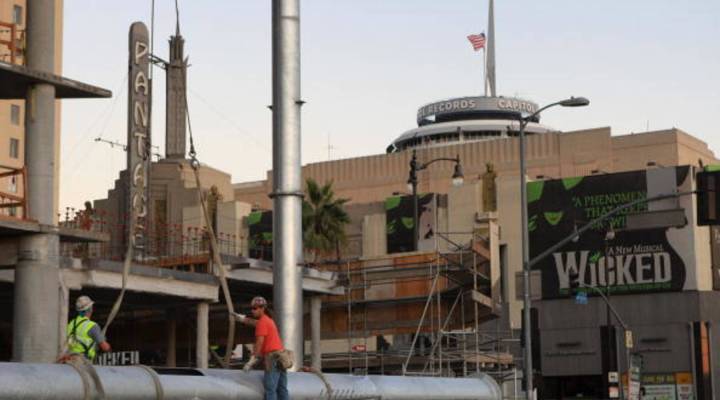
Why construction workers in LA make less than they used to
Why construction workers in LA make less than they used to

If you look at the immigration debate, you could say it’s fundamentally a jobs debate: who’s going to do the jobs, who’s taking the jobs and what the pay will be.
A good place to get a ground-level view of it is the construction industry in Los Angeles.
In general, the proportion of immigrant workers is up while the proportion of builders who are in unions is mostly down. And the pay is also down: Adjusting for inflation, construction workers in LA make $5 an hour less than they were making in the early 1970s.
Kai Ryssdal spoke with Los Angeles Times reporter Natalie Kitroeff, who’s been covering this story. Below is an edited transcript of their conversation.
Kai Ryssdal: Tell me about these two guys who you found for this story.
Natalie Kitroeff: So Eddie Ybarra is a union carpenter. He has built a solidly middle-class life on almost three decades of union wages. He makes over $40 an hour. He owns his home. He has a pension. He plans to retire pretty soon. Francisco Martinez, on the other hand, he is a non-union sheet metal worker. He makes $27.50 an hour. He can’t afford to cover his family on health insurance. He lives in a rented two bedroom apartment. He wants to move them into a home that he eventually will buy, but he has to work a lot on the side to make the kinds of wages that would support that.
Ryssdal: OK, so here comes the chicken and egg conversation. And it goes directly to the political discussion that we’re having in this country now about immigration and labor and jobs and all of that stuff. What came first? Construction companies moving away from union labor or immigrants coming in and dissipating the force of unions in this country?
Kitroeff: Our reporting shows that employers were pushing to lower wages a decade before immigrants started flooding the market. They wanted to shun union labor. They thought wages were too high. And so in the residential housing market, non-union shops started gaining power. That shift was made easier by the entrance of immigrants, because there was a ready supply of people who would work for less. But it started before they got here. And our reporting bears out is that they were a tool that allowed that to happen. It was well underway before they got here.
| Downtown Los Angeles becomes a giant construction zone |
| How one infrastructure project impacts the economy |
| Texas program helps fill the ranks of construction management jobs |
Ryssdal: Let’s say that again: It was happening anyway.
Kitroeff: It was happening anyway.
Ryssdal: Where do we go from here then? Because it’s not like unions are getting more powerful in this country. Immigration is in the crosshairs of the discussion at the moment. What happens?
Kitroeff: The question of whether unions are getting less powerful in this country is an interesting one. They, in some sectors, are making gains — in the media sector, actually, they’re making gains. Overall, the trend, of course, is against them. Where we go from here is actually a question for President Trump. If the immigration debate continues the way it is, and if we continue to restrict immigration to this country, what’s happening to labor markets is they’re getting tighter. That pushes up wages in and of itself. Construction employers have been complaining for a while that they can’t find enough good people. They haven’t as an entire industry raised wages much faster than average, but that may change.
Ryssdal: How much of what’s going on in this story and then anecdotally in construction and by extension in this economy, is because of that thing you hear all the time which is, “Oh, man, these jobs are here but Americans don’t want them?” You know, the thing that Americans are picky about the jobs they take.
Kitroeff: What I will say is that the reporting on this story showed is that the job itself changed over time. Someone who was working in construction in the ’70s earned more than they do today. So to say that Americans don’t want the job because for some reason it’s hard, or it’s dirty manual labor, is to ignore the question of wages. Perhaps, the union folks will say, people don’t want this job anymore because it’s not as good as it used to be.
There’s a lot happening in the world. Through it all, Marketplace is here for you.
You rely on Marketplace to break down the world’s events and tell you how it affects you in a fact-based, approachable way. We rely on your financial support to keep making that possible.
Your donation today powers the independent journalism that you rely on. For just $5/month, you can help sustain Marketplace so we can keep reporting on the things that matter to you.

















